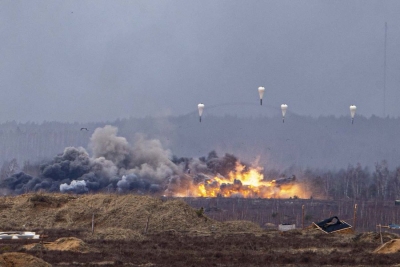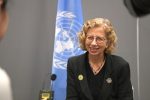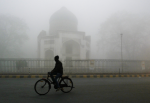
New Delhi: The conflicts raging in different parts of the world have devastated natural resources such as water systems, farmland and forests, in addition to causing widespread death and destruction.
Millions have been displaced and their livelihoods have been lost because of the wars and also because of the destruction of the ecosystem of the region they inhabit.
In Sierra Leone, for example, “when the guns fell silent in 2002 after a decade of conflict, our primary forests and savannahs also fell silent,” deputy foreign minister Francess Piagie Alghali told the UN Security Council in a recent meeting.Sierra Leone holds the rotating Security Council presidency this month.
There was loss of biodiversity, forced migration of wildlife, and abandonment of agricultural fields and swamps, all direct consequences of the armed conflict.
She also gave the example of Gaza where two years of war have caused the loss of 97 percent of tree crops, 95 per cent of shrubland and more than 80 per cent of annual crops.
“Freshwater and marine ecosystems are polluted by munitions, by untreated sewage and other contaminants,” she said, while “over 61 million tonnes of debris must now be cleared, with sensitivity to avoid further contamination.”
In Ukraine, the June 2023 destruction of the Kakhova Dam “led to the flooding of more than 600 km² of land, resulting in severe loss of natural habitats, plant communities, and species, through prolonged inundation of ecosystems,” she added.
One of the major consequences of Conflicts are pollution, waste, and the destruction of critical ecosystems, with long-term implications for food security, water security, the economy and health.
“Environmental damage caused by conflicts continues to push people into hunger, into disease and into displacement and thereby increasing insecurity,” says Inger Andersen, Executive Director of the UN Environment Programme (UNEP).
Meanwhile, climate change “exacerbates tensions” and can even contribute to conflict – over water or land resources.
Till date, there is no single binding universal treaty yet exists, but there are some he “so-called soft law instruments” that have made contributions to date, including the ILC’s set of 27 draft principles, adopted in 2022.
“The principles, rooted in the law of armed conflict, international environmental law and international human rights law, sought to strengthen the protection of the environment before, during and after armed conflict, including in situations of occupation,” says law professor Charles C. Jalloh, a member of the International Law Commission (ILC), a UN body.
—-India News Stream



















